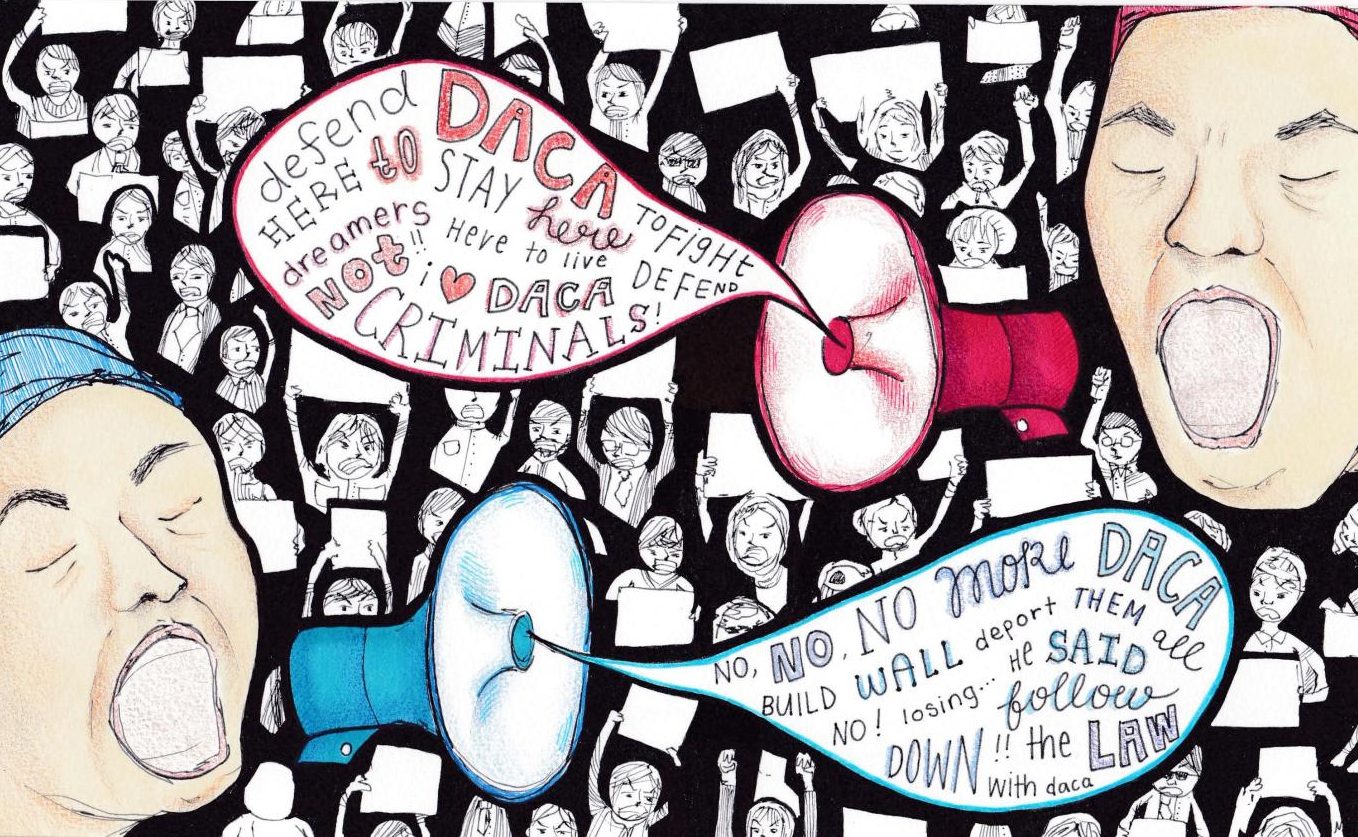Dreamers in jeopardy after DACA repeal
September 28, 2017
 Illustration by Sarah Kim and Elaine Park
Illustration by Sarah Kim and Elaine Park
On Sept. 5, the Trump administration announced the repeal of the Deferred Action for Childhood Arrivals (DACA) program, an immigration policy signed by President Obama intended to protect over 800,000 young undocumented immigrants from deportation, although a strategy that would allow the immigrants to stay in the U.S. is currently under discussion (CNN).
According to the Department of Homeland Security, DACA delayed the deportation of undocumented immigrants aged 15 to 31 — known as the “Dreamers” — for two years and granted them the ability to request work authorization. Although the Dreamers were not automatically given legal status, as long as applicants had lived in the U.S. since June 15, 2007 and maintained a clean criminal record, they could be shielded by DACA. As an executive order, not a law, DACA was never intended to be permanent. When the Trump administration reversed the policy on Sept. 5, applications from that point onward were no longer accepted. Congress has been given six months to create a more permanent legislative decision to address the Dreamers’ status.
Despite the initial statement on the planned abrogation of the program, an unexpected turn of events may work in the Dreamers’ favor. According to the Washington Post, a Sept. 13 meeting between President Trump and Democratic congressional leaders Rep. Nancy Pelosi and Sen. Charles Schumer introduced the tentative possibility of legislation providing for the protection of undocumented youth, accompanied by increased border protections to placate more conservative lawmakers.
The potential for action against the repeal has caused confusion while angering conservative Trump supporters and congressional Republicans. However, in a news conference on Sept. 14, House Speaker Paul Ryan (R-Wis.) stated there were no definite agreements made yet (The Washington Post).
The fate of the 800,000 Dreamers in the U.S. is largely indecipherable as of now, especially with the chance of some form of policy that would contradict the repeal. Regardless, the continued dismantling of DACA and increased deportations remains a contentious and palpable possibility.
Proponents of the repeal have praised the prioritization of the U.S.’s unemployed citizens in the Trump administration’s approach to immigration, claiming that undocumented immigration threatens Americans’ safety and economic security. While announcing the repeal of DACA on Sept. 5, Jeff Sessions, U.S. Attorney General, emphasized the importance of enforcing immigration laws.
“We are a people of compassion and we are a people of law. But there is nothing compassionate about the failure to enforce immigration laws,” said Sessions. “Enforcing the law saves lives, protects communities and taxpayers, and prevents human suffering. Failure to enforce the laws in the past has put our nation at risk of crime, violence and even terrorism” (Politico).
The highly controversial repeal has also been met with passionate disapproval. On Sept. 6, just a day after the repeal was announced, the attorney generals of 15 states and Washington, D.C. sued the Trump Administration over the nullification of the program (Time).
Former President Barack Obama also responded to the repeal on Facebook, voicing his belief that the repeal was detrimental to society and contradictory to American ideals.
“To target these young people is wrong — because they have done nothing wrong. It is self-defeating — because they want to start new businesses, staff our labs, serve in our military and otherwise contribute to the country we love,” he wrote. “And it is cruel. What if our kid’s science teacher, or our friendly neighbor turns out to be a Dreamer? Where are we supposed to send her? To a country she doesn’t know or remember, with a language she may not even speak?”
The ethical questions of the repeal are surrounded by a number of differing perspectives. On one hand, some have argued that the United States should prioritize citizens with legal status.
“National sovereignty is a thing,” said one anonymous Dougherty student. “Illegal immigrants cut in line in front of the people who actually want to become citizens and part of the country’s political destiny.”
Others defend the Dreamers, who often came to the U.S. as children and consider it their only home. They believe Dreamers should be allowed opportunities in the United States without fear of deportation.
“Immigrants should be just as welcome here as any other citizens, and it’s unjust to deport people from the only home they’ve ever known,” stated junior Shallom Omotayo. “I don’t see any benefits of repealing [DACA] besides solidifying the xenophobia of Trump’s administration.”
One of the main concerns with the repeal is the expected shortage of workers and taxpayer revenue. Ike Brannon of the Cato Institute told CNN his predictions for potential economic losses over the next 10 years. He believes the reduction of DACA recipients in the workforce could potentially precipitate a loss of up to $280 billion over the period of 10 years, hampering economic growth.
However, those opposing to DACA believe the solution to this is filling vacant positions with U.S. citizens rather than immigrants. Another anonymous Dougherty student believes the absence of immigrant workers will allow for unemployed Americans to begin supporting the economy.
“We’re aware that people are worried about how much money we’ll lose based on how many people will be displaced from their jobs, but those jobs will be filled by Americans. We cannot deny that illegal immigration is a problem,” they said, later adding that “‘America first’ is not a joke.”
The repeal of the DACA program has also caused concern in the realm of education, where the ability for undocumented students to continue their education remains a point of uncertainty.
“Our overarching goal remains the same,” said Principal Dave Kravitz. “We want our students to feel safe on our campus, in all facets of their lives, so that they can have the best, most fair access to a high quality education.”
Ms. Elizabeth Graswich, the Director of Communications & Community Relations for the San Ramon Valley Unified School District, echoed similar sentiments, placing an emphasis on equity and inclusion. She stressed the district’s intent to provide education for all students, regardless of their identities.
The DACA repeal will significantly impact California, where the number of Dreamers is estimated to be more than 220,000, according to U.S. Citizenship and Immigration Services. California’s response to the actions of the Trump administration can be seen at both the state and local level. Governor Jerry Brown plans to propose the appropriation of $30 million intended to support the Dreamers (LA Times). Additionally, the California Community College system has documented their intent to “vigorously advocate at every level of government to protect our students and our system’s values” in their “Resolution of the Board of Governors”.
Although some of California’s responses to the repeal have been made obvious, the constantly-developing nature of the attitudes and events surrounding the DACA repeal make it all the more difficult to pin down any definite conclusions. The complexity of immigration issues cannot be reduced to DACA alone, and until further decisions are made, the fate of the Dreamers will remain surrounded by uncertainty.
Brandon Shi, Opinions Editor, contributed to this article



